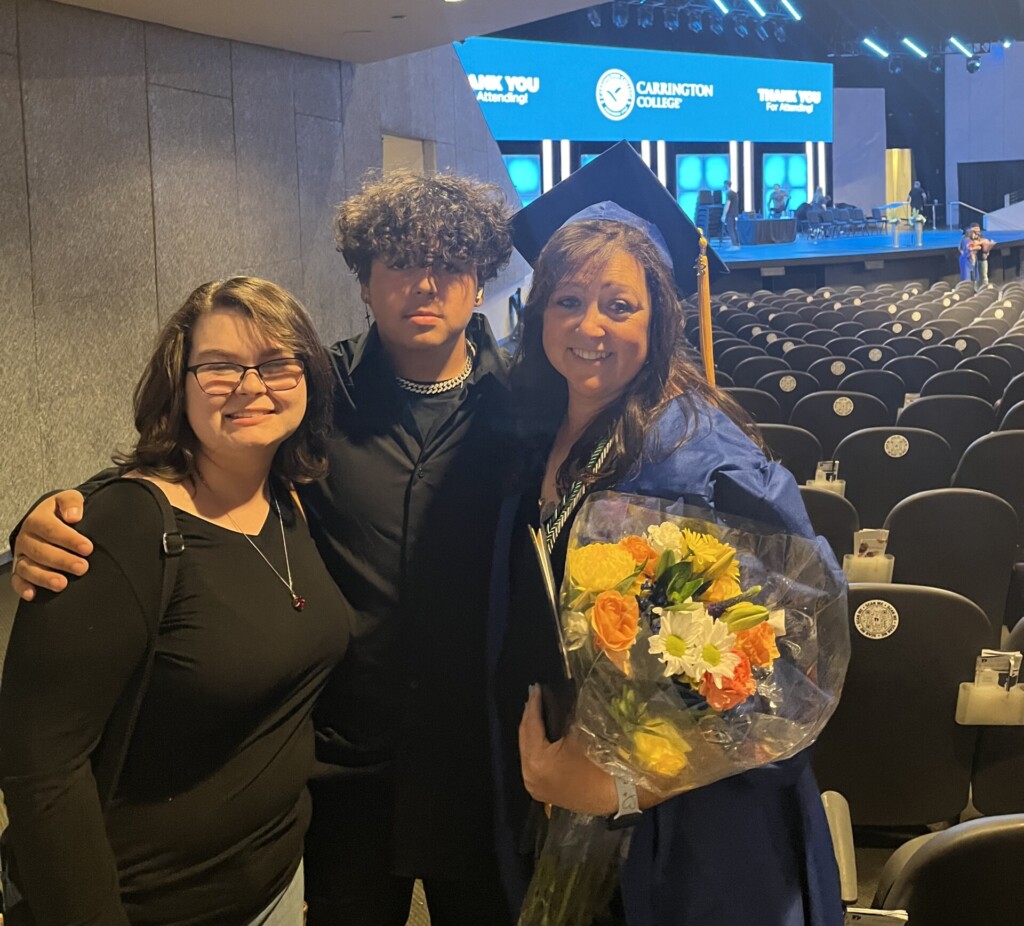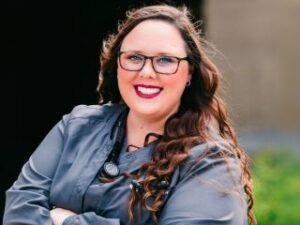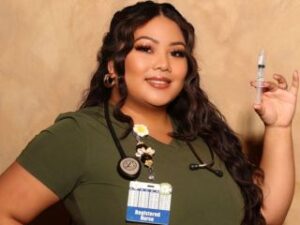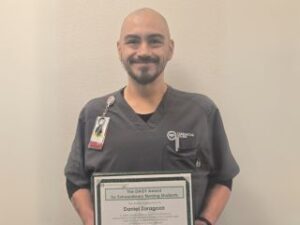 Not many middle-aged women, divorced with two kids and who had been a truck driver for 20-years would make a sharp career turn. But Cassi Howard felt ‘the calling’ and had the reassurance of others in her family that a medical career was the right move for her. She had watched her dad, Chuck, care for her mom (Marie) the last 15-years of her life, even as he worked full-time as a machinist. He was an inspiration. Could she be that for her two children, as well? Financial pressures, single-parenting, and a pressing need to help others would push her to test that possibility at Carrington College’s Respiratory Care program on the Phoenix campus.
Not many middle-aged women, divorced with two kids and who had been a truck driver for 20-years would make a sharp career turn. But Cassi Howard felt ‘the calling’ and had the reassurance of others in her family that a medical career was the right move for her. She had watched her dad, Chuck, care for her mom (Marie) the last 15-years of her life, even as he worked full-time as a machinist. He was an inspiration. Could she be that for her two children, as well? Financial pressures, single-parenting, and a pressing need to help others would push her to test that possibility at Carrington College’s Respiratory Care program on the Phoenix campus.
What gave you the courage to start a career in a completely new field?
My sister-in-law, who is a pharmacist, told me, “Cassi, your heart is too big to not work in a hospital.” I told her I do not wipe people’s butts! She reminded me that in Respiratory Care you only work from the lungs up. I had never considered any kind of health care job because I needed to be able to make the kind of money I made driving. But, as a single parent, I could no longer be on the road, out of state and not able to be home with the kids at night. So, I did short-distance drives for less money and had to pick up a second job to make ends meet. We were still barely making it.
What was your living situation when you started your Respiratory Care program?
Me and my kids had moved in to help papa take care of my mom; and he didn’t want to be alone. A week later she died. It was hard for all of us, but now we had each other close. Now he would help take care of my kids (Brianna now 19 and Austin, 15). They love their papa. And we had a routine. I would take the kids to school in the morning and pick them up on my way home from class. On days I had to work, Dad would pick them up. I tried to always have dinner ready for him to just put in the oven, but they did a lot of frozen pizza nights.
What was your Respiratory Care program like?
It was an intense program. Study, study, study. That’s the only thing that was going to get you through it. Be prepared for the quizzes and tests because it’s information you’re going to need to know on those boards (NBRC – National Board of Respiratory Care) in order to get your license. The faculty were really good about telling us what was to be expected both in the program and in patient care. They were teaching in a way that would help others be as good as they were, both in skill and a love for Respiratory Care. Their hearts were in Respiratory Care. I remember listening to one of my instructors telling us what it was like to help someone who can’t breathe, and how helping someone to breathe is so fulfilling.
What kind of instructor support did you find when you struggled?
All I had to say was I needed help – and most of the time they already knew. I stayed after class as much as I could for anything I couldn’t understand. They would stay late and draw it on the board over and over until I understood it. Sometimes we would have lunch together, just to go over the material. Instructors are preparing you the whole time to take your Board exams. The first one is multiple choice and the second one is a clinical simulation.
What did you most struggle with during the program?
Honestly, it was time management. I hardly had time for my family, and I had no personal life. I could only be at home when I was sleeping. My son would hang out with me until I fell asleep. I was sleep deprived and drank a lot of coffee to stay alert. I did my best with what I had.
 Did you have support from your family?
Did you have support from your family?
When I had to study or had exams coming up, I would just put myself at the kitchen table or in my room. I would struggle. I was not as young as other students, and my daughter would help me. She had to teach me how to build a PowerPoint. Sundays we would all go to church and have dinner together. My son would tell me, ‘Mom, just keep going. You need this and you’re doing so well.’
Do you have a ‘favorite moment’ memory?
It was when the Respiratory Care Program Director called and told me I’d made the Dean’s List and was put on the Lambda Beta Society for Respiratory Care and was given an award. I ended up graduating at the top of my class. I didn’t get to celebrate – I just went to work. But it felt good.
What inspired you to complete the Respiratory Care program?
Watching my dad take care of my mom my whole life, seeing what he overcame. At the end she was on a ventilator; using the equipment I am now trained to administer.
Did you attend your graduation ceremony?
We had been through a little bit, and I told my son I just didn’t want to go to graduation. My son told me he wanted to see me graduate. That was the best thing he could have said. The whole family was there when I walked across the stage. I hugged every one of the instructors. My daughter cried. Dad was very happy. I am the only one of four siblings to graduate college.
What advice would you give others who struggle to complete their medical career programs?
Don’t quit! It’s worth it in the end. Keep your feet planted. I’m not sure how I did it. The first life you save is going to be worth all the struggles you’ll go through in school.
What impact has your education and career had on your family?
I feel like we’ve all grown from this. I feel like my kids want to better themselves, as well. My daughter is going back to school again. She wants to get her Associates in Science, then Bachelor’s, then Masters degree to become a biologist. I tell my son he needs college if he wants to be an engineer. I want to go back to school to get my Bachelor’s degree and then go into an area (medical) to get my Master’s. All would make me better in Respiratory Care, and I could help people at a higher level.
How did your Respiratory Care Board exams go?
I did my first one in April, after I graduated in March. That was the multiple-choice test and the second one was the clinical simulation. I just found out I passed my second one on June 28th. It was so awesome! I ran into my son’s room screaming.
Where did you land in your new Respiratory Care occupation?
I had a Respiratory Therapist position in a long-term care facility two weeks before I graduated from the program. Our Respiratory Care program has 4-weeks of clinical experience (with participating medical facilities) and 2-weeks before graduation they offered me a full-time position at my extern site. But for now, I want to work part-time until I can move to a hospital environment that has so many options: NICU, ICU, ER and floors where patients are about to be discharged. Respiratory Therapists flourish in a hospital environment and there’s so much opportunity to learn more there. Carrington College will continue to help me in my job search when I’m ready to move to a hospital environment.
What kinds of treatments and medical services do you perform?
I am responsible for airways of any kind: lung, throat, trachea. You can only be on ventilation equipment so long, then you have to go to a trach – temporarily or permanently. I take care of people on a trach. My first day at my hospital the supervisor took me to two codes (emergency situations). My first experience was with a patient who had overdosed. I was instructed to give him CPR (chest compressions) and we were trying to bring him back. He didn’t make it. I teared up, seeing his lifeless body. It has happened several times since that first experience. The next time wasn’t as traumatic. I did everything I could.
Was this the right career choice for you?
I have such a big heart I feel like I want to save the world. I can only try my best.



